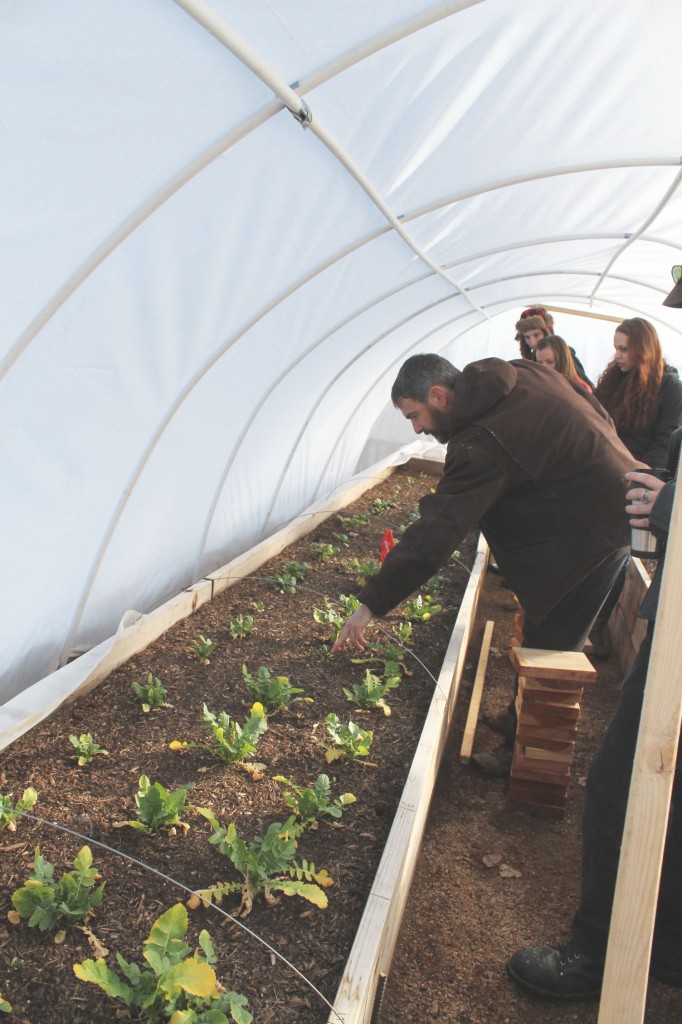Features Reporter
Photo by Malissa Smithey
Micro gardening is a trend sweeping the United States, and the Grand Valley is not excluded from this wave. In the spring of 2013, Western Colorado Community College added an Urban Gardening class to its curriculum under the umbrella of the culinary arts program.
The class, designed to help students understand and gain experience regarding how growing produce can help the local economy, is back this spring under a different name, Local Food Production.
Bryan Reed, instructor for the class, is excited to help students look for and possibly find that niche space that can help them compete in the marketplace, whether they are working in a restaurant or starting an organic farm.
“Lemongrass is hard to find here. Now that is a niche that could be filled,” Reed said as he finished introducing himself to the class on its first day, Wed., Jan 22.
After the in-classroom lecture, the students went out in the hoop houses to plan how they were going to change and replant the raised beds.

WCCC Prof. Bryan Reed shows his Local Food Production class a bed of vegetation planted last semester.
While two students fetched water, the rest of the class removed the coverings from the beds and Reed explained how the ends of the bed froze but the center stayed warm enough to sustain the vegetation that was planted a few weeks prior.
Reed brings with him a vast knowledge of local organic horticulture as well as experience with Community Supported Agriculture (CSA).
An avid horticulturalist, he worked with Osage Gardens in New Castle for four years, helping to gain an understanding of local growing conditions and mediums.
Next, found himself at Eagle Springs Organic in Silt, where he was an integral part in creating their one-acre indoor greenhouse and spent the next three years locating and naturalizing many plant strains used by their operation.
This is the fourth time that Reed will have taught this class. Topics he will cover include aquaponics, organic gardening, micro gardening, strains of produce that grow well in our area, and hands-on experience with maintaining and creating micro gardens.
“Four or five years ago I would not have thought that this could work here, but now I think it has a chance,” Reed said.
Heather Exby, Director of Student Services at WCCC, explained that the class is being used as a gauge for the sustainable agriculture degree program. Because the program is still in its infancy, there are slight growing pains, and one such is that this class is currently being offered under the culinary major rather than the sustainable agriculture program.
Because the course is a topics class, it is designed to help administrators gauge overall interest in the new topic. If students and WCCC administrators feel the Local Food Production class was a success, the school can apply for the class to become fully accredited, meaning it will become a part of the required curriculum for sustainable agriculture majors.
Dr. Ben Keefer, who is currently heading the agriculture program, said he ran out of time before this semester started, and because of that, the class is still being taught under the culinary program. The class averages about 80 to 90 percent culinary students, but Reed would like to see more students from the agriculture programs in the class as well.
Exby explained that although the class is currently designated for culinary students, anyone attending CMU and WCCC can attend the class and receive elective credit for their attendance. The class will give students a chance to see how they can become involved in bringing the farm to the table, both at home and in restaurants.
ldaniel@mavs.coloradomesa.edu
Recent Comments